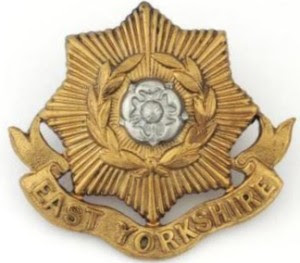Saturday, 11 November 2023
William Henry (Harry) Orwin - soldier and prisoner of war 1918
Just about every family in Great Britain and the Commonwealth was effected in some way or another by the First World War, many lost sons or husbands or brothers and every village has a war memorial with the names of the fallen from that village.
I have written earlier about my paternal Grandfather Robert Strickland and his injuries and survival in the Ypres Salient. My maternal Grandfather Herbert Cyril Orwin was too young to be called up to serve in the First World War as he turned 18 just a few months after the armistice, but his older brother Harry did serve and was also taken as a prisoner of war.
William Henry Orwin or Harry as he was called was born exactly two years before my Grandfather on the 6th April 1899 in Hull. He was named after his father William and his Grandfather Henry Bromby.
According to his Military papers Harry joined the army when he was 16 though he must have lied about his age as the minimum age for all recruits at the time was 18. He joined the East Yorkshire Regiment and in December of 1915 he was serving in Egypt. According to Wikipedia “The 10th, 11th, 12th and 13th (Service) Battalions were raised in September 1914 from men volunteering in Kingston upon Hull. These units were additionally entitled 1st, 2nd, 3rd and 4th City of Hull battalions and were known as the Hull Pals, nicknamed the 'Hull Commercials', 'Hull Tradesmen', 'Hull Sportsmen' and 'T'others' respectively. They formed the 92nd Brigade in 31st Division, and landed in Egypt in December 1915 and then moved to France in March 1916 for service on the Western Front.”
Harry was in the Lewis Gun Section of the East Yorkshire Regiment, he would have fought in many battles along the Western Front, in the Ypres Salient and in France.
According to Wikipedia at the end of May 1918 his Regiment was in the Aisne Department of France “In late May 1918 50th Division was moved to a 'quiet' sector on the Chemin des Dames ridge to relieve French troops. The sector was indeed quiet, but intelligence warned of impending attack, and on 26 May the battalion was alerted. A Company held the front line on the extreme left of the divisional sector, with B Company in close support and the other two companies in brigade reserve. Enemy gas shelling of Battalion HQs began at midnight and shellfire increased until it reached a crescendo at 01.00 on 27 May. At 06.00 the German infantry launched the Third Battle of the Aisne. There was no direct attack on 150th Bde, but successful attacks on the neighbouring French division and the rest of 50th (N) Division left the brigade to be enveloped on both flanks by 06.30. All communications to Brigade HQ were cut by shellfire, and nothing more was heard from 1/4th East Yorkshires' HQ; most of the battalion was overwhelmed, and rearguard actions were fought by small parties who worked their way back to the bridge over the River Aisne at Maizy. The battalion quartermaster attempted to hold the bridge with his men and the battalion transport details but was forced to withdraw. During 28–31 May the remnants of 50th (N) Division acted as a composite battalion (four officers and 105 other ranks from 1/4th East Yorkshires) under Lt-Col Stead. This served in 'Marshall's Force', holding the line while the German offensive was eventually stopped.”
On the 29th June 1918 an article appeared in the Hull Daily Mail with a list of soldiers from the East Yorkshire Regiment who were reported as missing since May 27th 1918, one of the missing was Private Harry Orwin.
This must have been a terrible time for my Great Grandparents, not knowing whether their son was still alive or whether he was injured and taken as a prisoner of war.
Finally three months later another article appeared in the Newspaper announcing that Mr and Mrs Orwin had received a postcard from their son Lance Corporal H. Orwin that he was a prisoner of war in Germany and that he was well. What a relief that card must have been for them though I can imagine that they would still have worried about how he was being treated as a prisoner of war.
According to military records Harry had suffered a wounded finger on his left hand.
Thankfully Harry eventually returned home and in 1924 he was married to Anne Margaret Fox.
Sitting on the far left of this photo is my great grandmother Theresa Orwin née Bromby and the handsome man standing to the left of the groom is my grandfather Herbert Orwin, younger brother of Harry. Their father William Orwin had passed away in 1921.
Subscribe to:
Comments (Atom)







